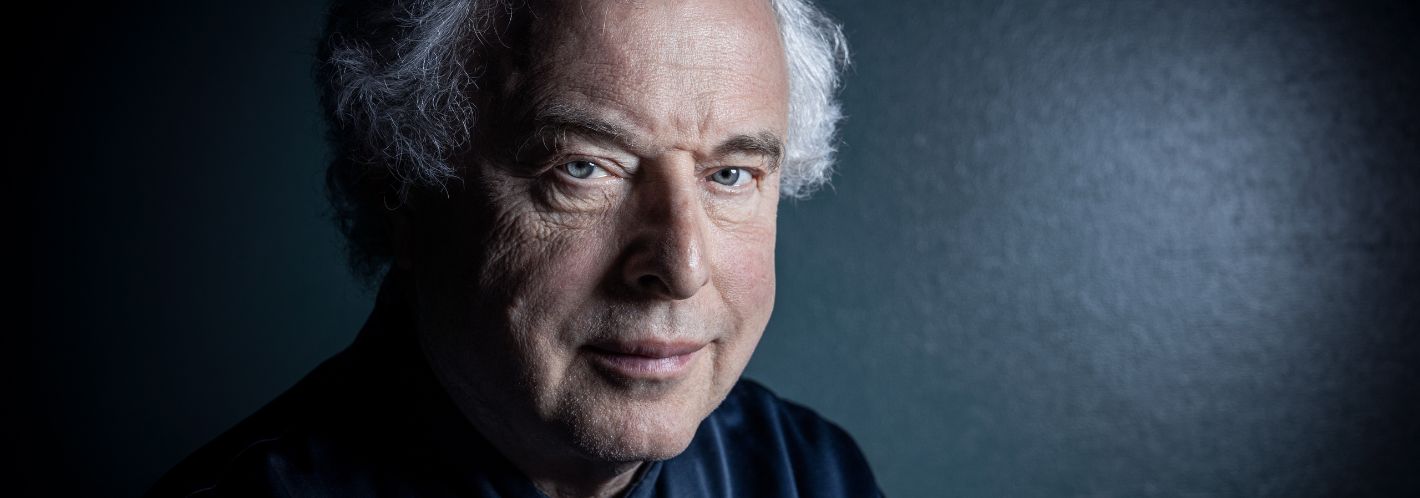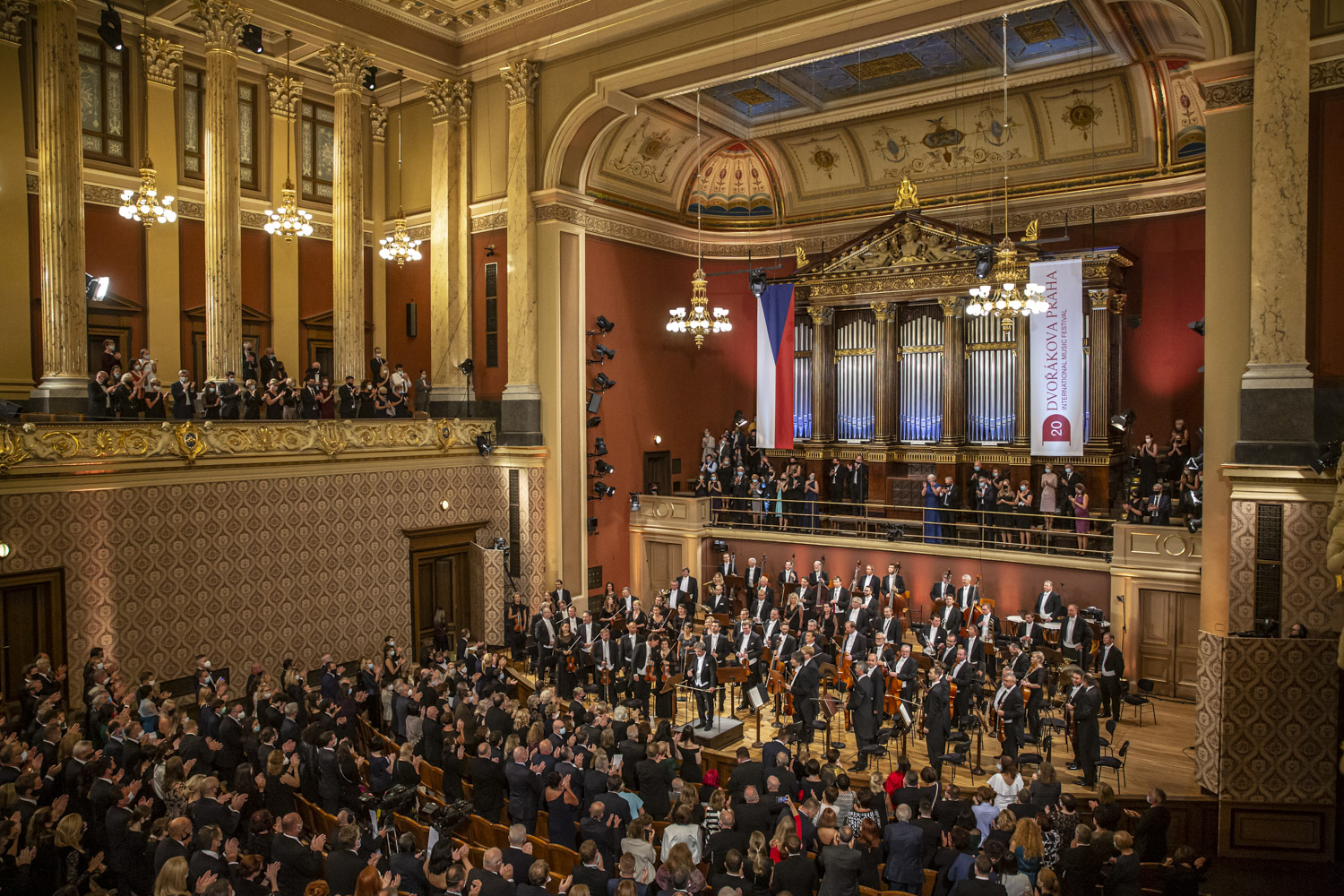
W. A. Mozart: Don Giovanni, Overture, K. 527
W. A. Mozart: Concerto for Piano and Orchestra No. 20 in D Minor, K. 466
Antonín Dvořák: Slavonic Dances, series I, Op. 46, B. 83
The closing of this year’s Dvořák Prague Festival will be a true grand finale. Joining forces will be the festival’s orchestra-in-residence the Czech Philharmonic, and the Dvořák Prague Festival artist-in-residence Sir András Schiff, who will be presenting himself not only as a pianist, but also, perhaps a bit surprisingly for some, as a conductor. No one, however, who is familiar with his work at the helm of the orchestra Capella Andrea Barca (a cryptogram of Schiff’s name) should be surprised; they will know that this is truly something to look forward to. Popular masterpieces by Wolfgang Amadeus Mozart and Antonín Dvořák will shine when given first-class performances by masterful interpreters.
The gates to Mozart’s music will be thrown open twice by dramatic chords in D minor; first with the overture to the opera Don Giovanni, which was given its world premiere at Prague’s Estates Theatre, which remains a fantastic venue for Mozart’s music to this day. The ominous sound of the orchestra in D minor also opens a beautiful piano concerto that reminds us perhaps even more that Mozart’s music never lacks exciting energy even at moments of seriousness.
The festival’s final moments will be devoted to the first series of Slavonic Dances, which make the impression as if Dvořák had simply jotted them down during a moment of great joy. Concealed beneath the spontaneous surface of these wonderfully composed pieces is the touch of a master who can do almost whatever he wishes with music. Surprisingly, this performance, together with the 2nd series of Slavonic Dances played by the Bamberg Symphony Orchestra with Jakub Hrůša, will be the first hearing of the orchestral versions of Dvořák’s Slavonic Dances in the festival’s history. This fact is further highlighted by the role of both orchestras and of Sir András Schiff as artists-in-residence at the 2021 Dvořák Prague Festival.
Sir András Schiff was born in Budapest in 1953. He received his first piano lessons at the age of five from Elisabeth Vadász. He later continued his studies at the Franz Liszt Academy in Budapest with Prof. Pál Kadosa, György Kurtág, and Ferenc Rados, as well as with George Malcolm in London.
Piano recitals have always been a central part of his artistic activities, particularly his cyclical performances of piano works by Bach, Haydn, Mozart, Beethoven, Schubert, Chopin, Schumann, and Bartók. Since the pandemic, he no longer announces the programs for his recitals in advance, instead selecting works on the evening of the concert to suit the instrument and the hall.
Sir András Schiff performs with most of the internationally important orchestras and conductors. He focuses on the performance of the piano concertos by Bach, Mozart, and Beethoven under his direction. In 1999, he founded Cappella Andrea Barca, a chamber orchestra composed of musician friends and soloists, with whom he has since worked closely as both conductor and soloist. He also enjoys a longstanding collaboration with the Chamber Orchestra of Europe. Since 1998, he has been the artistic director of the Omaggio a Palladio festival, held at the Teatro Olimpico in Vicenza with Cappella Andrea Barca.
In 2018, he accepted the invitation to become an Associate Artist of the Orchestra of the Age of Enlightenment, which met his growing interest in performing on historical keyboard instruments.
Sir András Schiff has been a passionate chamber musician since his youth. From 1989 to 1998, he directed the Musiktage Mondsee, a chamber music festival in Austria that gained significant international recognition. Together with Heinz Holliger, he was also the artistic director of the Ittinger Pfingstkonzerte at Kartause Ittingen, Switzerland, from 1995 to 2013.
Supporting young musicians is particularly close to his heart. He teaches piano and chamber music at the Kronberg Academy and the Barenboim-Said Academy and gives numerous masterclasses. In 2014, he founded the Building Bridges mentoring program, which provides long-term support for emerging pianists.
For 15 years, Sir András Schiff was an exclusive Decca artist; in celebration of his 70th birthday, the label released a box set containing all 78 albums he recorded for them. Since 1998, he has recorded exclusively for ECM, where his live recordings of Beethoven’s complete piano sonatas, performed at the Zurich Tonhalle, received the highest accolades. His album Geistervariationen, featuring compositions by Robert Schumann, won the 2012 International Classical Music Award in the category Solo Instrument Recording of the Year. A chamber music edition in collaboration with clarinetist and composer Jörg Widmann includes Brahms’s two clarinet sonatas, Op. 120, as well as Intermezzi for Piano, composed by Widmann and dedicated to Sir András Schiff. His most recent recordings include Brahms’s two piano concertos, performed on a historic Blüthner piano with the Orchestra of the Age of Enlightenment (2021), and a selection of J.S. Bach’s key works, played on a clavichord (2023).
In March 2017, his book Musik kommt aus der Stille (Music Comes Out of Silence) was published by Bärenreiter and Henschel. The book, which includes essays and conversations with Martin Meyer, explores Schiff’s artistic philosophy, playing techniques, interpretative methods, and professional experiences as a pianist and conductor. It has been translated into several languages and republished in 2024.
In the spring of 2011, Schiff made headlines when he publicly spoke out against alarming political developments in Hungary. In response to the insults and attacks he received from Hungarian nationalists, he decided to stop performing in his home country.
Sir András Schiff has received numerous international prizes and distinctions. In 2006, he was honoured with an honorary membership of the Beethoven-Haus Bonn for his outstanding achievements as a Beethoven interpreter. He has been the recipient of the Robert Schumann Prize of the City of Zwickau and the Order Pour le Mérite for Sciences and Arts since 2011. In 2012, he was awarded the Grand Cross of Merit with Star of the Federal Republic of Germany, the Wigmore Hall Medal in London for his 30 years of musical activity, and the Golden Mozart Medal of the International Mozarteum Foundation. In the same year, he was also appointed Special Supernumerary Fellow of Balliol College (Oxford, UK) and received the Royal Philharmonic Society's highest honour, the Gold Medal, in London. He received honorary doctorates from the University of Leeds in 2014 and the Royal College of Music in 2018. In 2013, he was knighted by Queen Elizabeth II, receiving the title Knight Bachelor for his services to music. In 2021, he was awarded the Antonín Dvořák Prize in Prague for his many years of promoting Czech composers through his numerous recordings and concert activities worldwide. In 2022, he received the Bach Medal of the City of Leipzig as one of the most important Bach interpreters of our time.
He has been an honorary citizen of the city of Vicenza since December 2014 and an honorary member of the Accademia Olimpica di Vicenza since 2016, from which he received the Lauro Olimpico in 2023 for his extraordinary contribution to the enhancement of Vicenza's artistic and cultural heritage. In March 2024, he was awarded the Una vita nella musica prize by the Teatro La Fenice in Venice. In January 2012, he was awarded the Golden Mozart Medal of the International Mozarteum Foundation. He has been an honorary member of the Wiener Konzerthaus since the same year.
In August 2023, at his 66th appearance at the Salzburg Festival, he was honoured with the Festival Pin with Rubies as an “essential artist who has shaped Festival history.” In June 2024, Sir András Schiff was awarded the Austrian Cross of Honour for Science and Art, First Class, and received the Bösendorfer Ring, which had previously been awarded to Wilhelm Backhaus and Paul Badura-Skoda.
source: Künstleragentur Dr. Raab & Dr. Böhm

The Rudolfinum is one of the most important Neo-Renaissance edifices in the Czech Republic. In its conception as a multi-purpose cultural centre it was quite unique in Europe at the time of its construction. Based on a joint design by two outstanding Czech architects, Josef Zítek and Josef Schultz, a magnificent building was erected serving for concerts, as a gallery, and as a museum. The grand opening on 7 February 1885 was attended by Crown Prince Rudolph of Austria, in whose honour the structure was named. In 1896 the very first concert of the Czech Philharmonic Orchestra took place in the Rudolfinum's main concert hall, under the baton of the composer Antonín Dvořák whose name was later bestowed on the hall.
